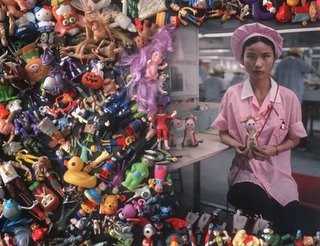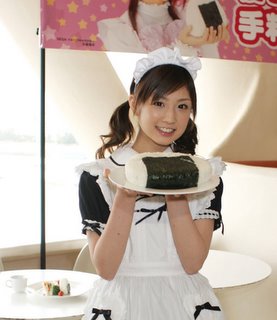
Left: Michael Wolf, The Real Toy Story, 2004, Mixed Media installation (detail)
Last week, my Modern Asian History class went to "Made in China," an instillation at the Museum of Contemporary Photography. My teacher's intent was to give the class some visuals of China today and an idea of the consequences of Western imperialism. The whole exhibition is filled with great stuff, but I worried about the neutrality of it. It provides examples of clean, productive factories, the dorms in which workers tend to live alongside of images of poorer working conditions, i.e. sweatshop labor. China wasn't necessarily put in a bad light; in fact, I was impressed that the photography managed to put a human face on an issue that is percieved as threatening by some in the United States. What I was concerned about was the fact that the companies, or the United States itself, was not put under any scrutiny. It was all "Look what these American companies have done for the poor people of China!" when we were presented with positive images or "The Chinese government is absolutely horrible" when presented with the negative. (Don't get me wrong, though, the Chinese government does practice some absolutely terrible things--but this is not the fault of the general population of China.) The piece I thought that tried to rectify this gap was The Real Toy Story--it's a piece that could be easily misconstrued because it features photographs of people working in less than desirable conditions, and once again the blame could just be placed on the leadership of China. However, surrounding the photographs are pieces of Happy Meal items and other cheap toys--toys encompassing pop culture for American kids. I was struck by the Batman and Doug figurines, two cartoons that I watched religiously when I was around ten. I also noticed the personified chicken mcnuggets that I used to play with in the bathtub when I was even younger. There were also Barbies; one had a black eye. (Drawn on by it's previous owner?) This specifically makes you aware that we are on a two-way street with China. Our consumption, yes, gives money, yet puts these people in a situation with few viable options. Capitalism in its truest, most disgusting form.
I left the exhibition upset. I know that I don't have any solutions, so I feel powerless. But I do know this: the United States is far from innocent, and in the words of Cat and Girl: "Capitalists do it ruthlessly."





